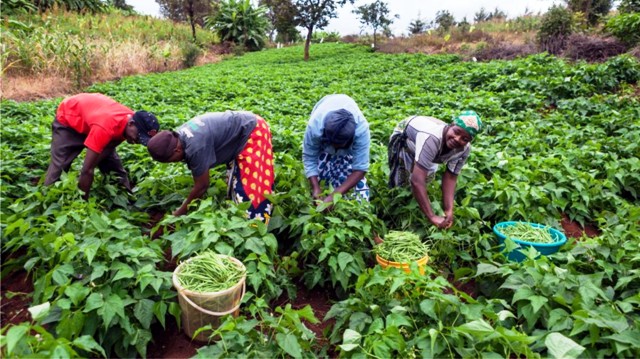Business
Rivers Farmers Happy As Rainfall Ushers In Planting Season

Farmers in Rivers State will now heave a sigh of relief as the setting in of the rainy season has ushered in this year’s planting season.
The Tide gathered that most farmers across the state had long prepared their farm lands in anticipation of the rain to water the ground for planting to take place but were a bit disappointed with the delay of rainfall this year, even though they express hope for the year’s farming season.
Speaking to The Tide, a peasant farmer in Ikwerre Local Government Area of Rivers State, Mrs Agnes Amadi said: “According to Ikwerre traditional farming rules and time table, the sharing of bush had been done since December period; we use January for cutting, burning and clearing of the bush. By mid January and early February when the rains will set in planting have started, but to our greatest surprise this year the rain did not come as expected, rather it extended till the first week of March this year.”
As a local farmer, she continued, “we depend on nature to provide for us and that is why any climatic change like this year affects the farmers and the farming season negatively. We are not mechanised farmers, we deal with crude implements, with labour and strength, and above all we are subsistent farmers.
“I am using this opportunity to plead with government to assist us the local farmers in the area of tackling flood. Now we are crying the rain did not come early after a while now, when the rain will be fully on ground we will be crying again for flooding that will ravage our farmlands and crops. So we are calling on government to start now to initiate a plan to channel some of these flood area to nearby canals and rivers, by this act our labour shall not be in vain as had been the case in previous time”
Another farmer in Etche Local Government Area of Rivers State, Chief James Njoku, said, “I am a cassava grower in addition to other crops and each crop respond according to the climatic factor, but above all rainfall is the mother of all successful farming. So the delay of rainfall this year means delay in farming season this year, but thank God it has come at last, giving us hope that our annual ritual must be fulfilled this year.
“We the local farmers our expanse of farm land depend largely on our strength and ability to hire labour, which is cost intensive. We therefore appeal to the state government to support farmers with agricultural micro-credit loan to aid us in hiring labour and other farm inputs. The farmers in the state have the capacity of complementing the efforts of the state government towards achieving its agric business objective”.
Business
Fidelity Bank To Empower Women With Sustainable Entrepreneurship Skills, HAP2.0
Business
President Tinubu Approves Extension Ban On Raw Shea Nut Export
Business
Crisis Response: EU-project Delivers New Vet. Clinic To Katsina Govt.
-

 News3 days ago
News3 days agoAmend Constitution To Accommodate State Police, Tinubu Tells Senators
-

 Politics3 days ago
Politics3 days agoSenate Urges Tinubu To Sack CAC Boss
-

 News3 days ago
News3 days agoDisu Takes Over As New IGP …Declares Total War On Corruption, Impunity
-
Business3 days ago
President Tinubu Extends Raw Shea Nuts Export Ban To 2027
-
Business3 days ago
Crisis Response: EU-project Delivers New Vet. Clinic To Katsina Govt.
-
Business3 days ago
President Tinubu Approves Extension Ban On Raw Shea Nut Export
-
Sports3 days ago
NDG: Rivers Coach Appeal To NDDC In Talent Discovery
-
Rivers3 days ago
Etche Clan Urges Govt On Chieftaincy Recognition

